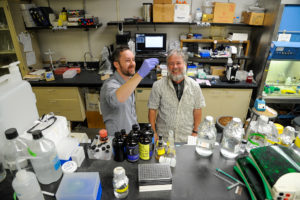
Associate Professor of Chemistry and Biochemistry Angus Lamar has been undertaking cancer research since he arrived at The University of Tulsa in 2015. An expert in organic and medicinal chemistry, Lamar’s investigations are focused on developing organic reactions that support the discovery and design of novel cancer-fighting drug compounds.
“At the outset,” explained Lamar, “my early research efforts concentrated on developing new organic reactions that produced molecules containing sulfonamide units that were previously inaccessible using traditional synthetic approaches.” As a result of this work, by 2018, he and his team had amassed a library of novel compounds that were suspected of having medicinal relevance, specifically as anticancer and antibacterial agents.
Targeting deadly cancers

Joined by Associate Professor of Chemistry and Biochemistry Robert Sheaff, Lamar and his team next began testing those compounds for biological activity against a variety of cancer cell lines. Since 2019, Lamar and Sheaff’s collaboration has resulted in five publications and multiple patents that feature synthetic methods for preparing sulfonamide compounds and screening them for biological activity. “One of the interesting things about the collaboration between Dr. Sheaff and I is that we can make new compounds and test them for activity simply by walking down the hall,” said Lamar.
Pancreatic cancer is one of the deadliest forms of cancer, with a 5-year survival rate of less than 11%. Through their research into new compounds, Lamar and his coresearchers are combatting that grim reality: “We’ve seen exciting results in targeting pancreatic cancer, and we have created new compounds that, when used in combination with an FDA-approved drug – 2-deoxyglucose (2-DG) – selectively kill pancreatic cancer cells but leave normal healthy cells and other types of cancer cells unharmed.” Recently, Lamar’s team has had success targeting glioblastoma cells – an equally deadly form of brain cancer – with a similar approach using different compounds synthesized in their lab.
In addition to pancreatic and brain cancer, the discoveries by Lamar and his fellow researchers hold potential for tackling breast cancer. “We recently returned to older data and found several compounds that, when combined with 2-DG, selectively target breast cancer cells instead of normal healthy cells or other types of cancer cells,” reported Lamar. “We intend to explore this data further and are planning future investigations that center around synthetically modifying those promising initial compounds in order to create a more potent drug to target breast cancer.”
Involving student researchers

Lamar received TU’s Outstanding Teacher Award in spring 2022. It is little surprise, therefore, that this deeply committed educator actively promotes opportunities for students to get involved in potentially life-saving research. A major benefit is that students are able to learn about and contribute to multiple aspects of the drug discovery process, including synthetic organic chemistry and biochemistry/biological assays. “I think this is something that is truly unique to the student experience at TU,” Lamar remarked.
Over the years, the students working with Lamar’s team have contributed greatly to pancreatic cancer research, with some co-authoring publications and some winning nationally prestigious awards, such as the Goldwater Scholarship. “I’m eager to see what our students will come up with as we start to expand research into breast cancer compounds,” said Lamar. “It will no doubt be impressive.”
Head over to The Lamar Research Group to learn more about the team’s pioneering research.






